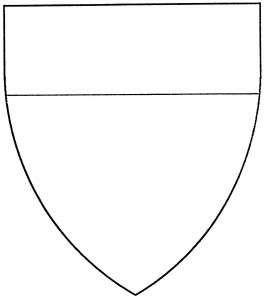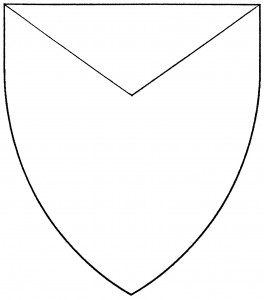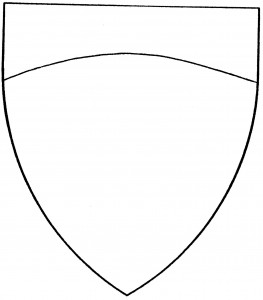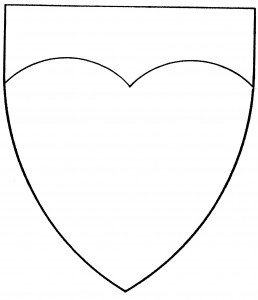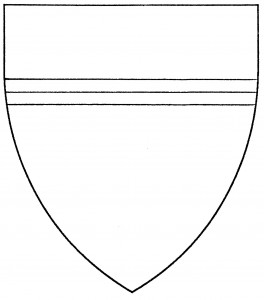The chief is an heraldic ordinary, occupying the upper one-third to one-fourth of the shield. It is subject to most of the standard treatments – embattled, nebuly, &c – though, because no period examples have been attested, the “chief fleury” is considered a step from period practice. However, because it has only one edge, a chief may not be “dancetty”, nor may it be fimbriated, cotised, or voided.
A “chief triangular” is formed by lines from the upper points of the shield, drawn to a point. The name is a translation of chef triangulaire, the French term for the charge; but the charge is found in English armory (under the blazon chefe entte pycche) as early as 1460, in the arms of Thorpe [RH].
A “chief enarched” is drawn with a concave arch; it was originally meant to depict the convexity of the shield, and consequently carries no heraldic difference. The “chief double-arched”, with two concavities, is first found in 19th Century British armory [Guide 75]; the “chief triple-arched”, with three concavities, seems to be a Society invention. The chief double-arched has been ruled a step from period practice; presumably the chief triple-arched is similarly anomalous.
A “fillet” is a narrow bar overlying the edge of a chief; though attested in heraldic tracts [Legh 81], it does not seem to have been actually used in period armory. It is considered the diminutive of the chief; but unlike the diminutives of other ordinaries, the fillet cannot be used except with its parent chief. Since the fillet’s prescribed usage is equivalent to a fimbriated chief, the only permitted way it may be used in the Society is “a chief charged with a fillet counterchanged”, as in the illustration.
Elizabeth of Hadley Hall bears: Lozengy Or and vert, a chief sable.
Phillip of the Valley of Sleep bears: Argent, a chief indented purpure.
Gavin MacRobert bears: Or, on a chief triangular gules a hawk argent.
Soraya Evodia bears: Gules, an escarbuncle and a chief indented Or surmounted by a fillet dancetty floretty counterchanged.
